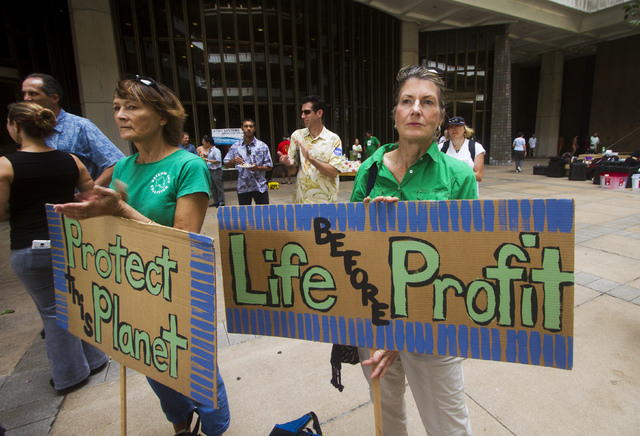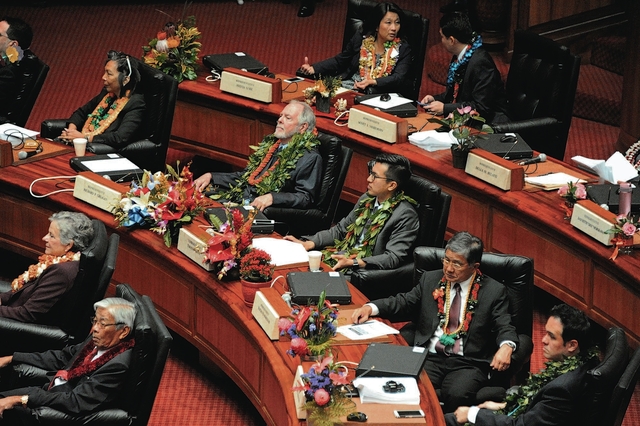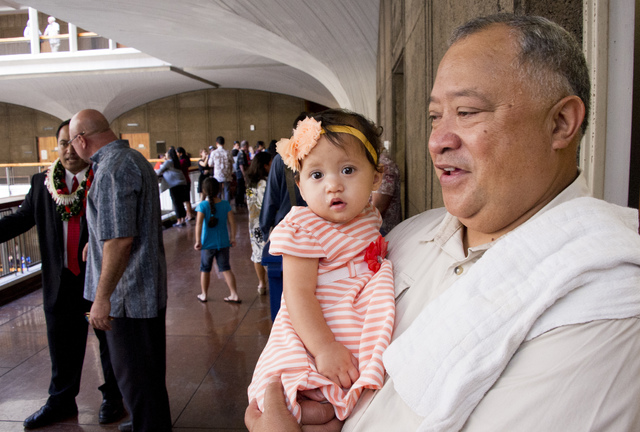Lawmakers launched the 2016 session of the state Legislature on Wednesday with brief speeches and little fanfare while activists staged a daylong rally in the Capitol courtyard to draw attention to issues ranging from pesticides and genetically modified foods to the Thirty Meter Telescope and Hawaiian sovereignty.
Inside the Capitol, House Speaker Joseph Souki offered up some proposals that are certain to be controversial, including a plan to require that all Hawaii doctors accept Medicaid and Medicare patients.
As a packed gallery looked on, Souki also proposed to “reinvent the rules” governing commercial property leases to require that owners of commercial real estate sell those properties to
lessees, or the businesses that lease those properties.
Souki said his proposal is similar to Hawaii’s 1967 Land Reform Act, which forced the sale of leasehold residential lands to the owners of single-family homes on those lands.
The House will also “consider” a proposal to establish a state lottery, Souki (D-Waihee-Waiehu, Wailuku) said, but he provided few details. Souki has long been a supporter of legalized gambling here.
Hawaii is one of only two states with no legal form of gambling, and it is unclear whether there is enough support among lawmakers to move a lottery bill forward. Vice Speaker John Mizuno (D-Kamehameha Heights, Kalihi Valley) agreed the House would consider a bill, but said he “would not hold my breath” hoping for it to pass.
Souki said he expects there will be strong support in the House this year to address homelessness and affordable housing. The bills he plans to propose dealing with Medicaid and Medicare patients and commercial leasehold conversion “may take a little more time, but some things just need to be introduced so that discussion can continue.”
A string of locally owned shops and stores have shut down in recent years because of increasing lease rents, “and it will not stop at anytime soon, driving more and more of them out of business,” Souki said.
“We can level the playing field and change for the better the business landscape across the state if we are willing to reinvent the rules that govern leasehold lands,” he said.
Rep. Gene Ward (R-Kalama Valley, Queen’s Gate, Hawaii Kai) described Souki’s proposal as “the Great Mahele” for commercial real estate, and predicted commercial property owners will fight the proposal “tooth and nail.” The Great Mahele of 1848 was a redistribution of land that permitted foreigners to buy large tracts and alienated many Hawaiians from their ancestral lands.
Ward predicted that even if Souki persuaded lawmakers to pass such a law, small businesses likely would not be able to afford the lands and large mainland companies would snap up the properties.
On the issue of health care, some Hawaii doctors refuse to accept Medicare or Medicaid patients, and Souki said he will introduce a bill to require physicians to see those patients. The measure “will help our kupuna, as well as those who must seek medical care but cannot afford it,” he said.
“This might be a bitter pill for the doctors, but we need to look at that,” he told reporters.
He added, “We cannot continue the way we’re going with people not being treated because they don’t have the income. That is wrong.”
After the opening-day session, Christopher Flanders, executive director of the Hawaii Medical Association, said that kind of law “would be a hard one for us to swallow, frankly.” He said he is not aware of any other state that requires doctors to accept Medicare and Medicaid.
Doctors generally break even on the Medicare patients they see, but lose money on each Medicaid patient they treat, Flanders said. Physicians have come to look at Medicaid patients as “charity work,” he said.
Hawaii already has a doctor shortage in many rural communities, and that kind of a law “would be looked at unfavorably by physicians who are looking to move to Hawaii,” he said.
House Health Chairwoman Della Au Belatti (D-Moiliili, Makiki, Tantalus) said Souki’s proposal “is a good conversation starter,” and said she would hold hearings on Souki’s bill. “We have a challenge with access (to health care), and so we need to look at all ideas on the table,” she said.
While Souki delivered his opening-day remarks, Senate President Ron Kouchi highlighted some of the major areas of concern for the Senate this year, including access to health care in rural areas, homelessness and the closure of Hawaii’s last sugar-cane plantation on Maui.
Kouchi (D-Kauai, Niihau) said specific measures to address these issues would be announced in the coming days as bills are introduced.
With close to 700 Hawaiian Commercial &Sugar Co. workers on Maui set to lose their jobs in the coming months, he said leaders need to employ innovative ways to stimulate the economy and find uses for the agricultural land.
He trumpeted the idea of installing a machine that could produce cheap animal feed, biofuels and natural gas for vehicles. The state Agribusiness Development Corp. has been working on the project for several years.
“These are the kinds of things that are important to us as far as looking for the opportunities that we have and not being stymied by what we think are disasters,” he said.
Kouchi said Sen. Jill Tokuda (D-Kailua, Kaneohe) would be introducing a package of bills to address Hawaii’s growing homeless problem. Beyond shelters, he said it was important for lawmakers to focus on long-term solutions, including affordable housing.
“Once we have the shelters and transitional programs, there has to be somewhere for them to go,” he said.
Kouchi, who kept his comments brief, also spoke of the need for civil public discourse around controversial issues as the 2016 legislative session gets underway.
“The function of the democracy is to embrace dissent and minority opinion to ensure that someone who has a different opinion is not afraid to come forward and express those points of view,” he said. “But at the end of the day, the function of the democracy is that the majority must carry the day and move forward.”
Outside the House and Senate chambers, community advocates and protesters complained that lawmakers weren’t hearing their concerns year after year. In a rally dubbed “People Over Profits,” speakers called for the need to regulate Hawaii’s biotech companies, stimulate more local farming, squelch the NextEra deal to purchase Hawaiian Electric Co. and address the growing homeless problem.
“I’ve been coming to this building for five years now,” Molokai activist Walter Ritte, who has been a champion for Hawaiian sovereignty issues and a leader in Hawaii’s anti-GMO movement, told a lively crowd. “These guys need hearing aids.”
The rally, organized by the Hawaii Alliance for Progressive Action, Hawaii SEED and Hawaii’s Sierra Club, was full of support for Hawaiian sovereignty with people at one point chanting, “We are not Americans.”
Kat Brady, coordinator of the Community Alliance on Prisons, encouraged the crowd to fight for the cause most important to them this year.
“This building is supposed to be our building,” she said. “This is all about people over profits.”






